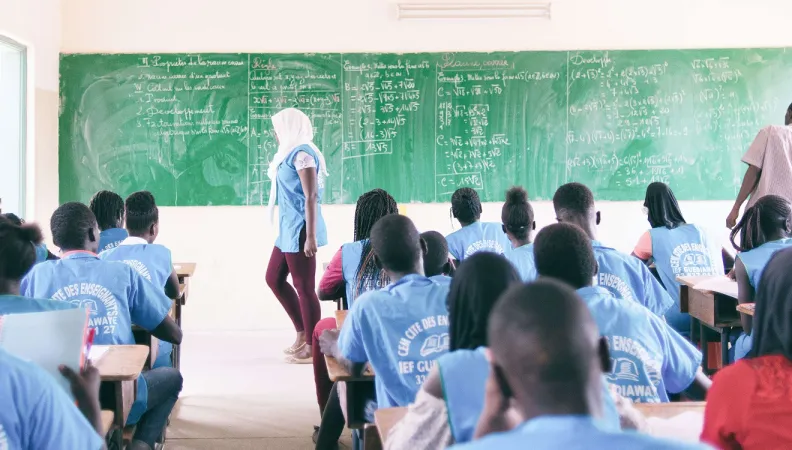Share the page
“There can be no Just Ecological Transition without Investment in Education”
Published on

How effective is education in tackling climate change? To mark International Day of Education on 24 January, we put the question to Bertrand Foucault, climate and nature specialist in AFD Group’s Education, Training and Employment Division.
What role can education play in tackling climate change?
We’re facing an unprecedented climate crisis, which is set to continue and get worse. Young people are directly affected. They want to take action to mitigate the negative effects of human activity on the climate and learn how to adapt. Education plays a major role in helping them gain a better understanding of the mechanisms at work, our dependence on nature, and ways to tackle these disruptions.
The ecological transition isn’t simply a technological and technical issue. It’s also about education, training, awareness-raising, supporting people, especially those most affected by climate change. Climate change also causes a lot of anxiety. Education helps us look positively towards the future. It can turn this stress into a strength that everyone can draw on to contribute to a more sustainable and equitable way of life.
What challenges do we face?
The inclusion of climate change in education still varies considerably across countries. These issues are often not included in the curriculum, or to a very limited extent. Young people are also increasingly living in urban areas and the link with nature has changed enormously. In addition, the education sector has lacked the perspective and presence of mind to adjust and incorporate appropriate material. The long-term relevance of programs needs to be monitored and evaluated.
Further reading: Transforming Education: AFD Group has Solutions in its Satchel
Generally speaking, there still isn’t sufficient awareness of how important education is in achieving a successful ecological transition. Indeed, if a country doesn’t invest in education, its population won’t learn about climate issues and develop skills in new activities. Inequalities will in all likelihood increase. People will also find it hard to adapt and support transition policies. So, there can be no just ecological transition without investment in education.
What action does AFD take in this field?
We work to ensure that the climate is included in curricula as comprehensively as possible, from basic education to higher education, and in all the subjects taught. For example, even in law and commercial studies, we feel it’s necessary to introduce awareness-raising on climate issues.
Under our AdaptAction program, with the Ministry of Environment of Senegal, we’ve identified activities to be implemented, such as capacity building for teachers, developing new courses and gender mainstreaming. With the French Facility for Global Environment (FFEM), we’re promoting education on climate issues for primary and secondary school students in Mexico and Colombia, by providing teachers with multi-disciplinary resources, training and support from local operators.
Our team in charge of awareness raising develops educational resources on the climate and more generally, on the Sustainable Development Goals (SDGs), to assist teachers in French schools abroad, in mainland France and in the overseas territories.
One example is Reunion, where the network of eco-delegates and young project initiators is very dynamic. AFD has also recently launched research programs with two research teams. The objective is to gain a better understanding of the effects that education has on the knowledge and perceptions of students and their families, as well as their actual commitment to the climate. It will also look at the effect that education has on social norms and the impact these norms have on attitudes towards the climate.
Training people now to find more solutions in the future
In terms of vocational training, we finance sector transformation programs, for example, in energy and agriculture, where we target vulnerable people. In certain regions, herders are already unable to work due to drought and coal miners’ jobs are threatened. It’s about offering them new opportunities with their communities and helping them acquire new skills. The aim is to ensure that the ecological transition is as just as possible and gain everyone’s support. This is what we’re doing in the Just Energy Transition (JET) programs we've started implementing in South Africa.
We systematically conduct a preliminary study on the projects we finance, so that we can design school infrastructure adapted to future climate change in the areas where they are built, and with high-energy efficiency. These schools must be integrated into their environment and be run virtuously in terms of the use of natural resources. But it’s early days yet. We aim to take things further with our partners and work together to ensure that public policies and teaching practices take greater account of education issues.
